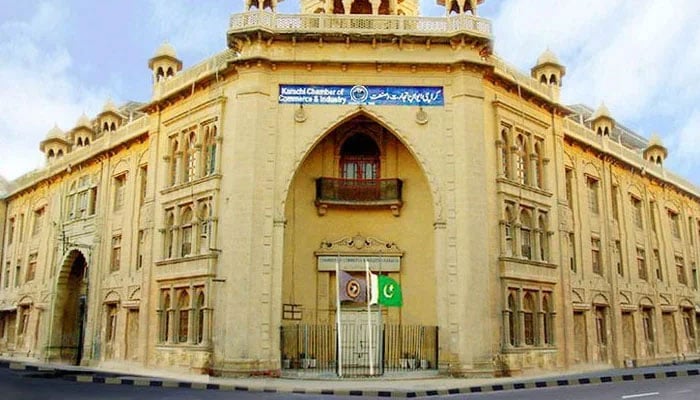KCCI seeks continuation of export finance scheme in original form
KARACHI: President of the Karachi Chamber of Commerce and Industry (KCCI) Jawed Bilwani has called for the continuation of the Export Finance Scheme (EFS) in its original form as it existed prior to Budget 2024-25.
“It must continue with the reinstatement of local purchases under Section 880(1)(b) of SRO 957(I)/2021, allowing the acquisition of local input goods liable to sales tax to be supplied against zero-rated invoices,” Bilwani said in a statement. “This is essential to ensure liquidity, competitiveness and formalisation across the entire value chain, as already recommended by the Inter-Ministerial Committee headed by the minister for planning and constituted by the prime minister. The EFS is imperative to ensure sustained export-led growth and an improved trade balance.”
Bilwani noted that Pakistan’s exporters have shown “remarkable resilience” despite facing the highest regional costs for electricity, gas, water and interest rates. He attributed much of this resilience to the support provided by the EFS, adding: “Preserving and enhancing this scheme is essential for maintaining our export competitiveness.”
He further highlighted that the EFS was designed through broad-based stakeholder consultation to simplify and streamline export procedures. The scheme consolidated all previous financing mechanisms into a single framework, reduced documentation requirements and facilitated ease of doing business via full automation, integrating with both WeBOC and Pakistan Single Window (PSW). It also incorporates real-time audits and end-to-end traceability to manage compliance costs and ensure transparency.
Bilwani emphasised that the EFS has played a critical role in easing liquidity constraints, particularly for exporters in the value-added textile and apparel sectors, where access to quality input goods is vital for maintaining production flows and meeting delivery schedules. He stressed that the import of specialised yarns and fabrics under EFS has been instrumental in helping exporters meet international standards.
“Much of the quality yarn and fabric used by Pakistan’s apparel exporters is not produced locally, and where local options exist, they are often of lower quality and higher cost,” he said. “Garment manufacturers using imported yarns are producing superior products, giving Pakistani exporters a competitive advantage in global markets.” He added that the value-added apparel sector achieves up to 70 per cent value addition on exported goods and requires uninterrupted access to high-quality raw materials. “Countries like Bangladesh and Vietnam are entirely reliant on imported raw materials for their export-oriented textile industries. Their success demonstrates the effectiveness of such models when supported by strong facilitation mechanisms,” he said.
-
 Paul Anka Reveals How He Raised Son Ethan Differently From His Daughters
Paul Anka Reveals How He Raised Son Ethan Differently From His Daughters -
 'A Very Special Visitor' Meets Queen Camilla At Clarence House
'A Very Special Visitor' Meets Queen Camilla At Clarence House -
 Jodie Turner Smith Shares One Strict Rule She Follows As A Mom
Jodie Turner Smith Shares One Strict Rule She Follows As A Mom -
 Hailey Bieber Reveals KEY To Balancing Motherhood With Career
Hailey Bieber Reveals KEY To Balancing Motherhood With Career -
 Photo Of Jay-Z, Other Prominent Figures With Jeffrey Epstein Proven To Be Fake
Photo Of Jay-Z, Other Prominent Figures With Jeffrey Epstein Proven To Be Fake -
 Hillary Clinton's Munich Train Video Sparks Conspiracy Theories
Hillary Clinton's Munich Train Video Sparks Conspiracy Theories -
 Fans Slam Talk Show Host For 'cringe' Behavior In Chris Hemsworth Interview
Fans Slam Talk Show Host For 'cringe' Behavior In Chris Hemsworth Interview -
 Woman Jailed Over False 'crime In Space' Claim Against NASA Astronaut
Woman Jailed Over False 'crime In Space' Claim Against NASA Astronaut -
 James Van Der Beek’s Close Pal Reveals Family's Dire Need Of Donations
James Van Der Beek’s Close Pal Reveals Family's Dire Need Of Donations -
 Prince William And Harry's Cousins Attend 'Wuthering Heights' Event
Prince William And Harry's Cousins Attend 'Wuthering Heights' Event -
 Hailey Bieber Turns Heads Just Hours After Major Business Win
Hailey Bieber Turns Heads Just Hours After Major Business Win -
 King Charles' Andrew Decision Labelled 'long Overdue'
King Charles' Andrew Decision Labelled 'long Overdue' -
 Timothee Chalamet 'forever Indebted' To Fan Over Kind Gesture
Timothee Chalamet 'forever Indebted' To Fan Over Kind Gesture -
 Columbia University Sacks Staff Over Epstein Partner's ‘backdoor’ Admission
Columbia University Sacks Staff Over Epstein Partner's ‘backdoor’ Admission -
 Ozzy Osbourne's Family Struggles Behind Closed Doors
Ozzy Osbourne's Family Struggles Behind Closed Doors -
 Dua Lipa Claims Long-distance Relationship 'never Stops Being Hard'
Dua Lipa Claims Long-distance Relationship 'never Stops Being Hard'




